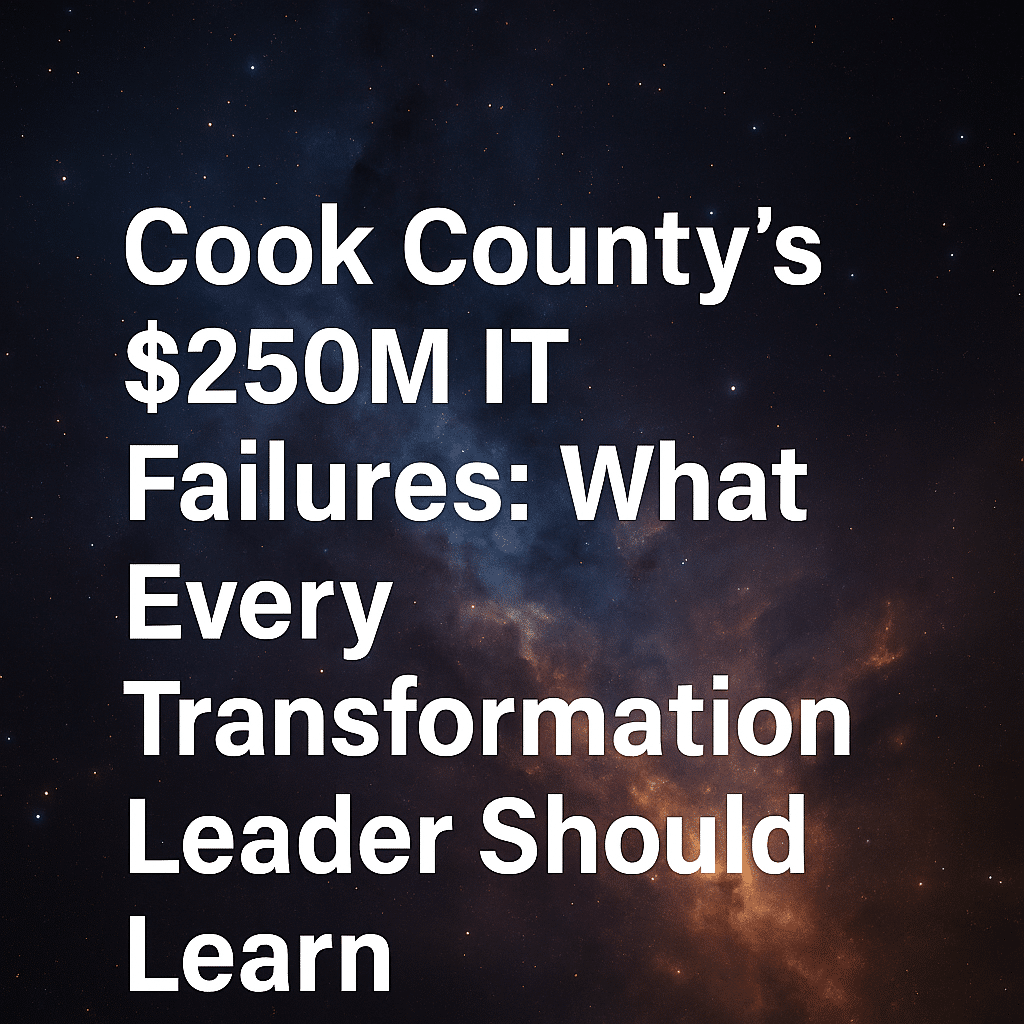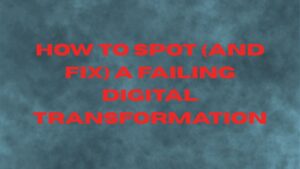When one of the largest counties in the United States sets out to modernize its technology, you’d expect time, budget, and resources to guarantee success. But as Cook County, Illinois shows us, big investments can still lead to massive failures — proving that money alone doesn’t guarantee better outcomes.
Over the past decade, Cook County — home to more than 5 million residents and the city of Chicago — has burned through nearly a quarter of a billion dollars across three failed technology initiatives:
- An Oracle ERP deployment
- A Tyler Technologies court system overhaul
- A Tyler Technologies property tax system
Each ended in major disruption, budget blowouts, or outright failure. The story is painful for taxpayers — but packed with lessons for transformation leaders everywhere.
Table of Contents
ToggleCase Study #1: The Oracle ERP That Never Landed
Cook County launched an Oracle Fusion ERP in 2016 to automate HR, finance, procurement, and other core operations. The project was slated for completion by 2018.
Fast-forward to today: after more than $75M spent, the county pulled the plug. Why?
- No business case to anchor decisions.
- No Phase Zero planning — no blueprint, no target operating model.
- Over-customization that created unnecessary complexity.
- Leadership turnover that derailed direction.
- Minimal change management — the people side was largely ignored.
Notably, Oracle’s software wasn’t the main culprit. Poor governance and planning were.
Case Study #2: Courts in Chaos
In 2017, the county contracted Tyler Technologies to modernize its court system under a $36.5M agreement.
The project ran 18 months late, caused operational errors across the courts, and was branded by leaders as “one of the worst IT projects” in county history.
Case Study #3: The Property Tax Disaster
Also with Tyler Technologies, Cook County set out in 2015 to automate its property tax system. What began as a $75M project ballooned into $250M, with no end in sight.
The fallout extended beyond balance sheets:
- 200M+ tax payments delayed
- $50M in taxpayer refunds on hold
- Massive frustration for citizens left waiting on their money
Cook County resorted to launching a public project dashboard to pressure Tyler Technologies, but the system remains incomplete.
The Real Lessons for Transformation Leaders
Cook County’s string of failures offers stark reminders for any organization — public or private:
- A business case is not optional.
It’s more than a budget justification; it’s your north star for governance, scope decisions, and measuring success. - Don’t skip Phase Zero.
Define your future operating model, integration roadmap, and change strategy before signing contracts. - Keep customization in check.
Customization is a slippery slope. Govern it with discipline, not convenience. - Invest in change management.
Technology alone doesn’t deliver value. People, adoption, and cultural readiness determine outcomes. - Own your project.
Vendors can’t be left to run the show. Build a strong internal PMO, enforce accountability, and take a “trust but verify” stance.
Why This Matters Beyond Cook County
Government projects often face heightened scrutiny — but the pitfalls are universal. Overruns, misaligned governance, poor planning, and lack of change management derail private-sector transformations just as easily.
The difference? Private companies risk competitive disadvantage, while governments risk eroding public trust.
Learn More
If you’re leading or advising a government digital transformation, download our Government Digital Transformation Report for best practices, case studies, and independent software reviews.
For private-sector leaders, explore our Digital Transformation Report for industry-agnostic lessons to avoid becoming the next Cook County headline.
🤝 The Executive Mastermind
An exclusive peer network of transformation leaders collaborating on strategy and innovation.
Learn more
Takeaway: If Cook County’s failures teach us anything, it’s that throwing money at technology doesn’t guarantee success. What does? Strong governance, disciplined planning, and treating digital transformation as more than just an IT project.






